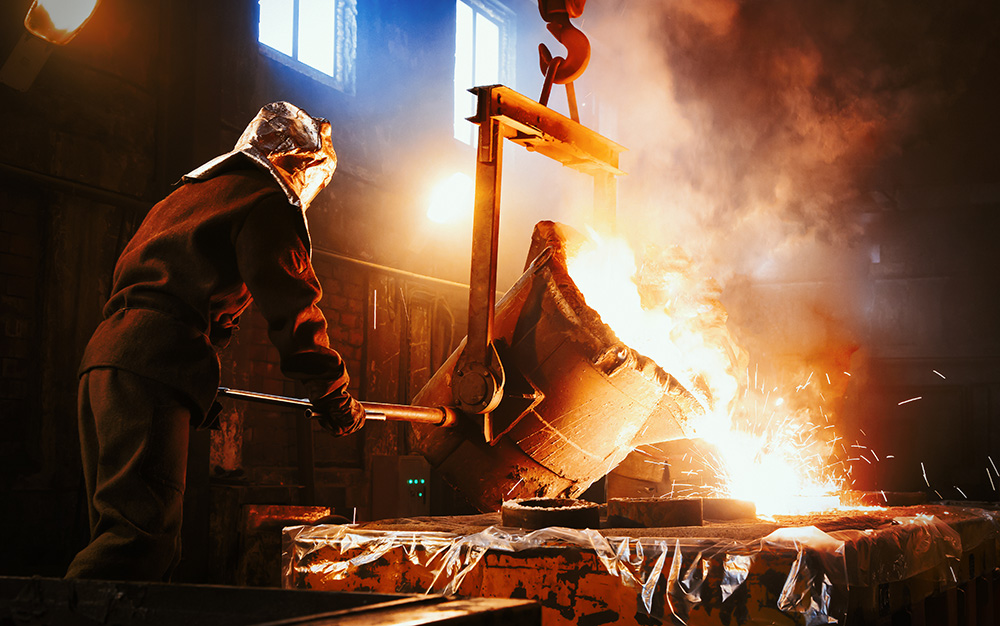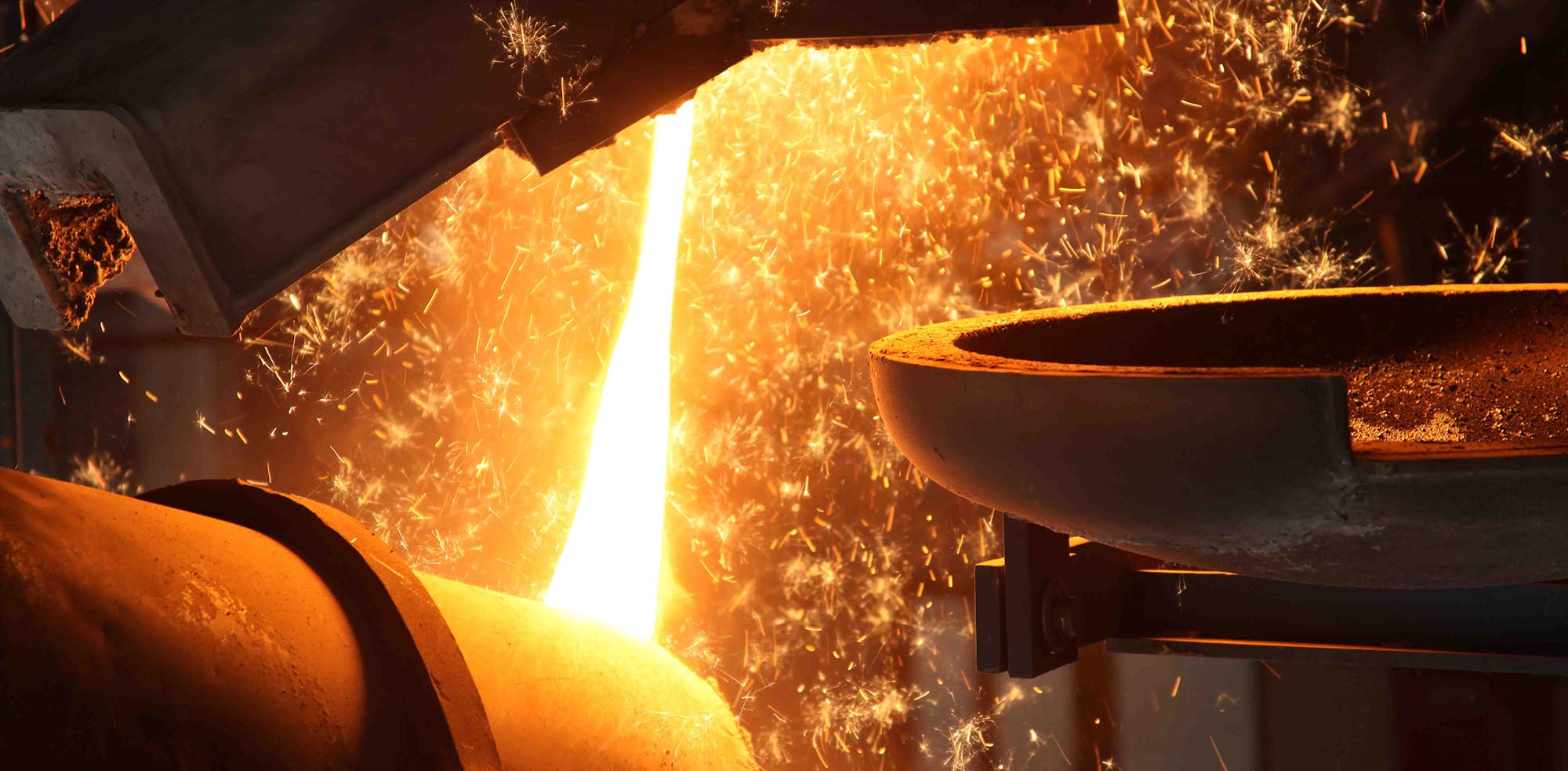Exactly How a Metal Foundry Adds To Sustainable Metal Production Practices
Metal foundries play a necessary role in promoting sustainability within the metal production industry. By incorporating recycled materials, they decrease reliance on virgin resources and minimize ecological influences. Energy-efficient melting procedures additionally decrease power intake and exhausts. However, the journey toward sustainable practices entails greater than simply reusing and power management. It encompasses a wider commitment to moral sourcing and innovative technologies. The ramifications of these practices are significant and warrant more detailed assessment.
The Role of Recycling in Metal Foundries
While metal manufacturing has actually generally counted on virgin materials, the increasing focus on sustainability has caused a substantial change in techniques, especially in metal foundries. Recycling has emerged as an important component of this improvement, enabling foundries to repurpose scrap metal and reduce dependence on mined sources. By incorporating recycled materials into their processes, foundries not just lower ecological impact however also reduced production prices.
Making use of recycled steels, such as copper, steel, and light weight aluminum, decreases energy consumption and minimizes greenhouse gas discharges associated with conventional mining and refining techniques. Additionally, foundries can accomplish high-grade outputs by utilizing sophisticated sorting and handling modern technologies to guarantee the pureness of recycled products. This emphasis on reusing fosters a circular economy, where waste is decreased, and sources are used effectively. Consequently, metal foundries play a crucial role in advertising lasting techniques within the metal manufacturing industry.
Energy-Efficient Melting Strategies
Energy-efficient melting methods are crucial for boosting sustainability in metal manufacturing. These methods substantially minimize energy usage during the melting procedure, which is just one of the most energy-intensive phases in metal manufacturing. Technologies such as induction melting, resistance home heating, and microwave melting offer improved efficiency compared to traditional approaches. Induction melting, for example, utilizes electromagnetic fields to create warm straight within the metal, lessening energy loss and supplying specific temperature level control.
Additionally, carrying out warmth recuperation systems can better enhance effectiveness by catching and reusing waste heat produced throughout melting. Using advanced insulation materials and enhancing heating system layouts also add to power savings. By adopting these ingenious melting strategies, metal foundries can lower their carbon footprint, lower functional costs, and add to a more lasting production landscape. The combination of energy-efficient methods not just straightens with ecological goals but likewise satisfies the expanding need for accountable production methods in the metal industry.
Sustainable Sourcing of Raw Products
Sustainable sourcing of resources is important for minimizing the ecological impact of metal production. This entails the raised use of recycled metals, the adoption of moral mining practices, and campaigns targeted at regional sourcing. By focusing on these techniques, the market can promote liable source administration and assistance local economies.

Recycled Metal Application
Exactly how can industries successfully lower their environmental impact while satisfying the expanding need for metal? One significant method is the application of recycled metal. By incorporating scrap metal into their production procedures, foundries can decrease the removal of virgin materials, consequently minimizing and conserving natural resources energy consumption. Recycled steels call for less power to process compared to their raw equivalents, causing reduced greenhouse gas emissions. Furthermore, using recycled metal assists divert waste from land fills, promoting a round economic climate. Industries that prioritize recycled metal not just contribute to sustainability yet additionally gain from expense savings connected with decreased product purchase. Recycled metal usage stands as a vital approach for ecologically liable metal manufacturing.
Honest Mining Practices
While the demand for steels proceeds to rise, sectors are significantly acknowledging the significance of ethical mining practices in guaranteeing liable sourcing of raw products. Moral mining incorporates a commitment to ecological stewardship, social duty, and adherence to reasonable labor methods. Companies are currently prioritizing collaborations with mines that show openness in their operations, lessening ecological impact and appreciating local areas. This strategy not just fosters a sustainable supply chain but likewise improves the online reputation of organizations included. By carrying out extensive requirements and accreditations, sectors can deal with unlawful mining activities and advertise the welfare of employees. Eventually, moral mining techniques contribute markedly to a more lasting metal manufacturing ecosystem, aligning financial growth with social and ecological integrity.
Local Sourcing Efforts

Advancements in Metal Casting Procedures
Innovations in metal casting procedures are changing the industry by check my reference incorporating innovative recycling methods that minimize waste. Energy-efficient melting methods are additionally being developed to minimize power usage during production. Furthermore, making use of cutting-edge mold products adds to enhanced performance and sustainability in casting procedures.
Advanced Recycling Techniques
Advanced recycling methods are changing metal casting procedures, substantially improving sustainability in the market. These developments concentrate on recovering and reprocessing scrap metal, significantly reducing waste and the demand for virgin materials. Methods such as hydrometallurgy and pyrometallurgy enable foundries to remove beneficial steels from used components, ensuring reliable source usage. Furthermore, progressed sorting and filtration innovations boost the top quality of recycled steels, making them suitable for high-performance applications. This not only reduces the ecological footprint of metal manufacturing yet additionally cultivates a circular economic situation by promoting the reuse of products. As these recycling techniques remain to advance, they promise to further enhance procedures within foundries and add to an extra sustainable metal production landscape.
Energy-Efficient Melting Methods
While typical melting techniques have long been the foundation of metal casting, current improvements have presented energy-efficient strategies that substantially minimize energy consumption and discharges. Technologies such as induction melting and electric arc heaters have actually acquired prominence, enabling for specific control over temperature level and reducing the demand for fossil fuels. These techniques not only improve power performance however additionally promote quicker melting times, which converts to decrease functional expenses. Furthermore, innovations in warmth healing systems enable foundries to record and recycle excess warm generated during the melting process. This alternative approach to power monitoring not only supports sustainable techniques yet additionally placements metal foundries as leaders in the shift towards greener production procedures, better straightening with worldwide sustainability objectives.
Ingenious Mold Materials
As the demand for more lasting and effective metal casting processes expands, the expedition of cutting-edge mold and mildew products has actually ended up being a centerpiece in the industry. Conventional mold and mildew materials often contribute to ecological challenges, prompting the look for choices that lower waste and power intake. Current developments include the development of recyclable composites and eco-friendly binders, which not just improve mold efficiency yet additionally reduce environmental impact. Additionally, using 3D printing innovation in mold and mildew creation enables for complex layouts that minimize material usage and make it possible for rapid prototyping. These cutting-edge products not just enhance casting precision however additionally straighten with sustainability objectives, showcasing the industry's dedication to lowering its carbon footprint while keeping top notch manufacturing requirements.
Reducing Waste With Advanced Technology
Ingenious technologies are see this transforming the metal production industry by significantly reducing waste and improving performance. Advanced data analytics and machine learning formulas allow foundries to optimize manufacturing processes, determining inefficiencies and reducing scrap product. Smart sensing units keep an eye on devices efficiency in real-time, enabling anticipating maintenance that decreases downtime and waste generation. In addition, additive manufacturing strategies, such as 3D printing, allow for the creation of complex components with marginal material use, markedly lowering waste contrasted to traditional approaches.
Additionally, closed-loop systems are coming to be a lot more widespread, where scrap metal and results are reused back into the production cycle, making sure that products are made use of to their greatest possibility - Aluminum Foundry. This integration of technology not just advertises resource preservation yet additionally enhances the overall sustainability of metal manufacturing practices. By embracing these innovations, foundries can add to an extra lasting future while preserving competitiveness in the market
The Effect of Foundries on Carbon Impact Reduction
Foundries play a vital duty in decreasing the carbon impact of the metal manufacturing sector by executing numerous lasting techniques. By utilizing energy-efficient modern technologies, such as electrical arc furnaces, these centers significantly lower greenhouse gas discharges compared to traditional techniques. Additionally, foundries increasingly adopt renewable resource resources, which likewise decreases their dependence on fossil fuels.
Recycling scrap metal is one more vital practice that foundries utilize, conserving sources and reducing the requirement for web link virgin products. This not just minimizes waste yet likewise reduces the energy-intensive removal procedures related to mining. The fostering of closed-loop water systems helps to minimize water usage and decrease wastewater discharge, adding to a more sustainable procedure.
Via these initiatives, foundries show their dedication to environmental stewardship, causing a marked reduction in the total carbon footprint of the metal manufacturing field. Their recurring initiatives are crucial in the shift toward a more lasting commercial landscape.
Frequently Asked Questions
What Kinds of Metals Are A Lot Of Typically Recycled in Foundries?
Aluminum, copper, brass, and steel are among one of the most commonly recycled steels in foundries. These steels are favored because of their high recycling prices, economic value, and extensive availability, adding greatly to industrial sustainability efforts.
How Do Foundries Make Certain the Quality of Recycled Materials?
Foundries establish the high quality of recycled products with strenuous screening, sorting, and filtration procedures. They apply advanced modern technologies to assess structure and get rid of contaminations, assuring that the recycled metals meet sector requirements for efficiency and security.
What Certifications Exist for Lasting Foundry Practices?
Numerous qualifications exist for sustainable foundry techniques, consisting of ISO 14001 for environmental administration, ISO 50001 for power monitoring, and LEED certification for sustainable structure methods (Aluminum Foundry). These certifications aid assure adherence to ecological and sustainability criteria in procedures
How Do Foundries Measure Their Carbon Impact Decrease?
Foundries measure carbon footprint decrease through tools like lifecycle evaluations, energy audits, and discharges tracking systems. They compare baseline emissions to present outputs, examining renovations in energy effectiveness, material usage, and sustainable power fostering with time.
What Are the Economic Advantages of Lasting Metal Manufacturing?
Sustainable metal production uses financial benefits such as decreased operational costs, increased performance, improved market competition, and prospective federal government incentives. Additionally, it fosters development and draws in environmentally aware customers, inevitably driving lasting success for companies.
Metal foundries play an important function in promoting sustainability within the metal production market. While metal manufacturing has traditionally depended on virgin materials, the boosting focus on sustainability has led to a considerable shift in methods, particularly in metal foundries. By integrating scrap metal right into their production procedures, foundries can reduce the removal of virgin materials, therefore saving all-natural sources and decreasing power usage. Foundries play an important role in minimizing the carbon impact of the metal manufacturing market by applying numerous lasting methods. Recycling scrap metal is one more critical method that foundries employ, preserving resources and lowering the need for virgin products.